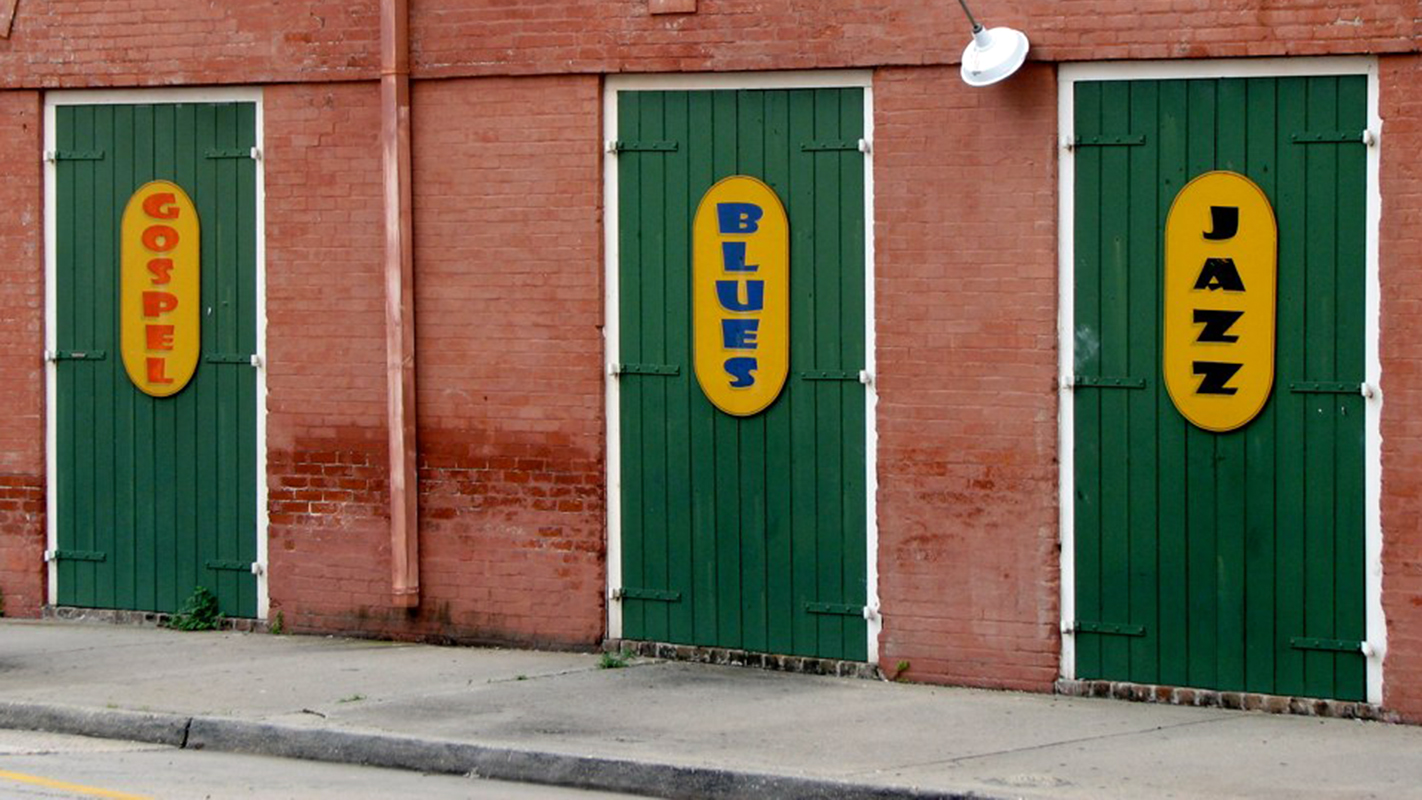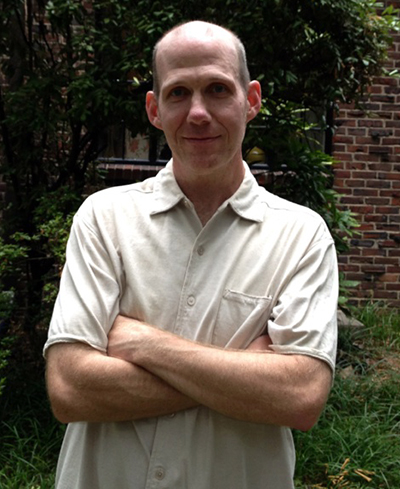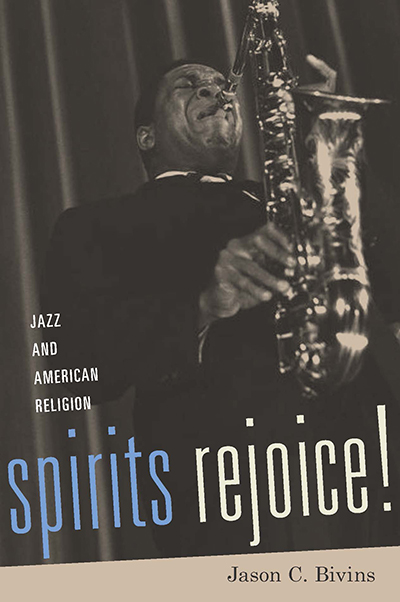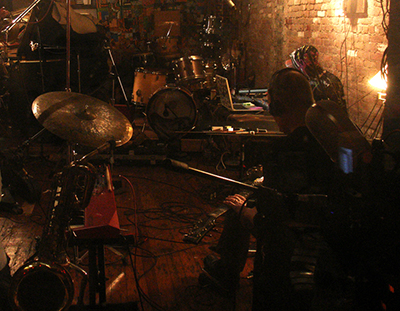Spirits Rejoice! A Musician and Scholar Talks About Jazz, Religion, and American Culture

The poet Ted Joans once wrote, “Jazz is my religion.” He might have said that jazz is religion, and he wouldn’t have been far off the mark – the two subjects are intertwined at the root.
Jazz is indigenous to the United States, shaped by a confluence of cultures and musical traditions – including faith-based traditions. A new book explores that relationship, addressing how religion has both shaped the music and the way people think about it.

Jason Bivins’s background makes him particularly well-suited to explore both subjects. Bivins is a professor of religious studies at NC State, specializing in the nexus of religion and U.S. politics. He’s also a jazz musician, recording improvisational albums with bands such as the Unstable Ensemble, the Micro-East Collective and the Impermanence Trio.
In his book, Spirits Rejoice! Jazz and American Religion, Bivins explores a variety of issues, from how jazz musicians have drawn on specific religious traditions to inform their music to musicians who view performance as a ritual.
We talked to Bivins to learn more about Spirits Rejoice!, jazz, religion and American culture.
The Abstract: Before I ask about the book, can you tell me a little bit about your background as a jazz guitarist? How did you get started? What sort of music do you play?
Jason Bivins: Absolutely. When I got to Oberlin College in 1987, I very quickly had my ears expanded in a lot of listening sessions. I dove into the deep end of the pool with Coltrane and a bunch of electric Miles, Mahavishnu, Jeff Beck and related things. It all had an intensity I recognized from my background in punk and post-punk, but it was so much more musically demanding. In time, I tried to translate those ideas into my own playing, first in prog-influenced “rock” bands. By the time I went to graduate school, I was almost entirely involved in improvisational music, some structure, a lot free. I’ve certainly played in straight-ahead settings, and I’ve led bands that perform tunes I’ve written, but I remain attracted to the immediacy of completely open improvisation, with all its possibilities and downfalls.
TA: Do you still play shows or record?
Bivins: Yes, though not quite as actively as I did a decade ago. There are fewer and fewer opportunities to tour, at least at my level, though I still play the occasional show or three out of town. But I’m fairly active locally, playing once a month on average, I suppose. I’ve still managed to sneak out a couple of records in the last few years, and there are a couple others in the can.
TA: You’ve been a musician since you were a teenager, and you’ve been a religion scholar for more than 20 years. What made you decide to write this book? And why didn’t you write about the subject sooner?

Bivins: I wrote some papers in graduate school, and since the 1990s I’ve periodically given talks under the book’s title, because my involvement with the music kept turning up more and more connections between what people call jazz and what people call religion. But I was committed to making my name in the study of political religions. I was surprised, as the years went by, that nobody wrote a big comparative study. There were some good portraits of individuals here and there, but nothing that really treated religion and jazz outside of the obvious musicological connections between African-American Christianity and early jazz. So after Religion of Fear came out in 2008, I decided that I would draw on my multiple experiences and try to write about this broader range of religions in/and/of jazz.
TA: You started work on the book in 2008. What were the key themes you planned to focus on when you started the book project?
Bivins: Initially, I was compelled by how jazz musicians understood religion as central to their identity and how religion helped keep the music from cooptation or routinization. That’s academic low-hanging fruit in some ways, but at least it got the ball rolling and it is actually important to the self-understanding of a great many people I interviewed or whose stories I knew.
TA: Did those key themes change once you dug into the work? If so, how and why?
Bivins: Big time. Now that initial focus is there as a frame, and is discussed explicitly in the conclusion, but the more I researched, the more I found confirmation that jazz has been a part of larger American developments in – and improvisations on – key religious concerns and practices like historical narrations, communitarian experiments, ritual, meditation and cosmology. That so many different themes were accreting convinced me that it was simply not possible to understand the history of jazz without accounting for this abundant religiosity.
TA: You came up with a listening guide to accompany Spirits Rejoice! – a sort of chapter-by-chapter playlist. What do you think that adds to the experience for readers?
Bivins: The old line that writing about music is like dancing about architecture is particularly true with jazz, since we often have no lyrical content to go by. I tried to do the best I could in terms of musicology, evocative description, and laying out musicians’ intentions and understandings. But there’s absolutely no substitute for the real thing. I think some of the intensity of emotion and interaction, those circumstances the musicians avow are religious, can definitely be experienced by listeners whether or not they ascribe those same meanings to them.
TA: Were these songs that you were listening to as you wrote, or did you assemble the playlist after the fact?
Bivins: In many cases, yes. As I wrote about particular artists, I often tried to have their music playing so that something of their style could inflect the writing. I’ll have to leave it to readers to say whether this was successful or not, but it certainly made the writing process a unique (and very enjoyable) one.
TA: Professional musicians are often entertaining personalities, but they can also have tragic lives. Did you turn up any particularly funny or poignant stories while you were working on the book?

Bivins: In some sense they were all poignant, since jazz in general has fallen on such hard times compared to the status it once (rightfully) enjoyed. Talking with these folks about how difficult it is to make it – playing door gigs, giving tons of lessons, that kind of thing – gave me a renewed appreciation for artistic commitment. But it also bummed me out to be reminded of how little we value artists in the United States, less so than ever.
TA: Were there any stories that were outstanding but didn’t make it into the book?
Bivins: Following from the above, there were lots of great anecdotes and funny episodes that had to be trimmed from the book (the first draft was vastly too long). There was a killer tale about how Dizzy Gillespie took great pleasure in deflating the machismo of his band when Melba Liston first came in to play trombone and write charts. And another one about Miles Davis eating someone else’s steak as they watched. And a few case studies had to be pruned, too. I’m hoping to put some of this unpublished stuff up on the blog in time.
TA: I know you’re also writing a series of blog posts for Oxford University Press that are related to the book – including one on John Coltrane and his landmark A Love Supreme album. Are these essentially excerpts from the book? Or are you expanding on people and themes in the book?
Bivins: So far they’re basically condensed excerpts. But over the next few months, I may do some op-ed types of entries.
TA: Has your work on this book changed the way you view yourself as a jazz musician? Has it changed the way you view yourself as a religion scholar?
Bivins: It hasn’t really changed how I view my musicianship, other than perhaps to make me more enthusiastic about playing than ever. But it’s certainly opened up a lot of scholarly possibilities, both in terms of intellectual challenges and writing style. Spirits Rejoice! is definitely still an academic monograph, but I tried hard not to let that get in the way of writing a book that resonates with all aspects of my life, from long before I ever thought of becoming an academic. Who knows: I may have another music book in me at some point.
- Categories:


